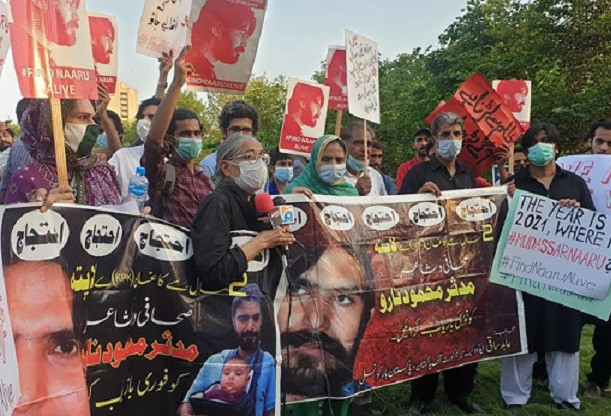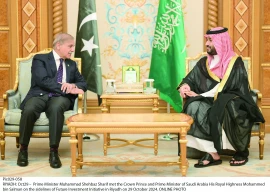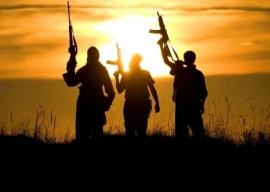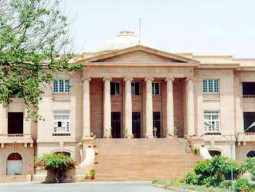
The Islamabad High Court on Wednesday said the government was responsible for recovering missing persons and the onus rested on the prime minister and the members of the federal cabinet.
During the hearing of a case concerning the disappearance of journalist Mudassar Mehmood alias Naaru, IHC Chief Justice Athar Minallah also remarked that it was the responsibility of the state to protect the lives of citizens.
The court was hearing a petition filed by Rana Mehmood Ikram, the father of the journalist, who had reportedly gone missing on August 19, 2018.
Federal Human Rights Minister Shireen Mazari as well as Interior Secretary Yousuf Naseem Khokhar appeared before the IHC bench.
Additional Attorney General Qasim Wadud and Deputy Attorney General Syed Tayyab Shah were also present in the court.
Advocate Usman Warraich appeared on behalf of the petitioner but Advocate Imaan Mazari was unable to attend as she was unwell.
Addressing Mazari, Justice Minallah said that the State showed no concern for the recovery of the missing journalist.
He added that the families of the missing persons were protesting on roads for years, but the apathy of the state in this matter was unfortunate.
The IHC CJ noted that the State acted as a mother so it should treat the family of the missing person in the same manner.
“A person going missing is a crime against humanity. The prime minister and members of the cabinet are there to serve the people of the country. The State's response towards recovering missing persons is pathetic."
Justice Minallah remarked that if a person came to the court stating that a loved one had disappeared, it meant that the State had failed. He added that the State being accused of kidnapping a citizen was a "serious crime".
The judge noted that if a public office holder's loved one disappeared, the entire State machinery would be mobilised. "The government's response should also be the same when a common citizen disappears."
The IHC CJ observed that the court was informed that the missing journalist's wife had also passed away.
Read SC reprimands police over missing Hazara persons
"All agencies are under the control of the federal government. This is not a matter of summary or reports. You need to satisfy the children and parents of the missing person. The State has a responsibility to take care of the children and listen to the affected family," Justice Minallah told Mazari.
Mazari informed the bench that she was in touch with various authorities for the recovery of the missing journalist and they had been asked to look into this matter.
She added that Prime Minister Imran Khan along with Amna Janjua, the human rights activist, had protested against enforced disappearances in the past.
The minister said the government was working on compensation for the family of the missing person on a monthly basis.
The IHC CJ noted that it did not matter if allegations against the State were true or false. “The family has been going door-to-door for three years now and this should stop right away.”
He added that the family should be taken to the prime minister and a meeting with the cabinet members be arranged.
The IHC CJ told Mazari to ensure that the missing person's family came back "satisfied" after meeting with the prime minister.
The minister replied that an affidavit had not been received yet, according to which the payment needed to be processed.
“The prime minister will definitely listen to his [missing journalist] family, but first we want to process the payment of expenses for them which will be done by next week.”
Justice Minallah remarked that the premier and the cabinet members should pay the compensation to the missing person’s family instead of the State so that the issue could be concluded once and for all.
The minister said the government considered enforced disappearances a serious crime and nobody was allowed to indulge in this heinous practice.
The IHC CJ remarked that there could be a law that would penalise the chief executive in case someone went missing during their tenure.
“If someone went missing in 2002 then why not impose fines on those responsible then, the then chief executive,” he noted, adding that someone should be held responsible for the practice of enforced disappearances.
“Half of our lives have been spent in undemocratic regimes and this is their doing. At present, everyone, including the police and ministries, has gotten a free hand,” he observed, adding that he was also talking about the state and the non-state actors.
In the written verdict, the IHC CJ noted that in the case of enforced disappearances, "the buck stops with the federal government i.e. the worthy prime minister and members of the federal cabinet".
"It is their constitutional duty not only to find the missing person but to discharge the onus of satisfying the loved ones of the missing person that no state actor is involved, nor complacent in their trauma and agony," the judgment read.
The judge directed the human rights minister to ensure a meeting between the parents of the parents and children of the missing person with the prime minister before the next hearing.
"The matter shall thereafter be placed before the federal cabinet i.e. worthy prime minister and its members. The latter shall direct all the agencies under its control to produce the missing person before this court or trace his whereabouts," the order added.
"In case the missing person is not produced before this court nor his whereabouts are traced, then the federal cabinet shall ascertain the agencies and public functionaries responsible for the failure and inform this court regarding the action taken against them.”.
Justice Minallah also directed the attorney general to appear and assist regarding the responsibility and liability of the federal government in case the missing journalist was not produced before the court or if his whereabouts were not traced.
The court directed Mazari to submit a reply at the next hearing on December 13.



1719660634-1/BeFunky-collage-nicole-(1)1719660634-1-165x106.webp)

1732276540-0/kim-(10)1732276540-0-165x106.webp)


1724249382-0/Untitled-(640-x-480-px)1724249382-0-270x192.webp)


1732270499-0/Express-Tribune-(7)1732270499-0-270x192.webp)









COMMENTS
Comments are moderated and generally will be posted if they are on-topic and not abusive.
For more information, please see our Comments FAQ